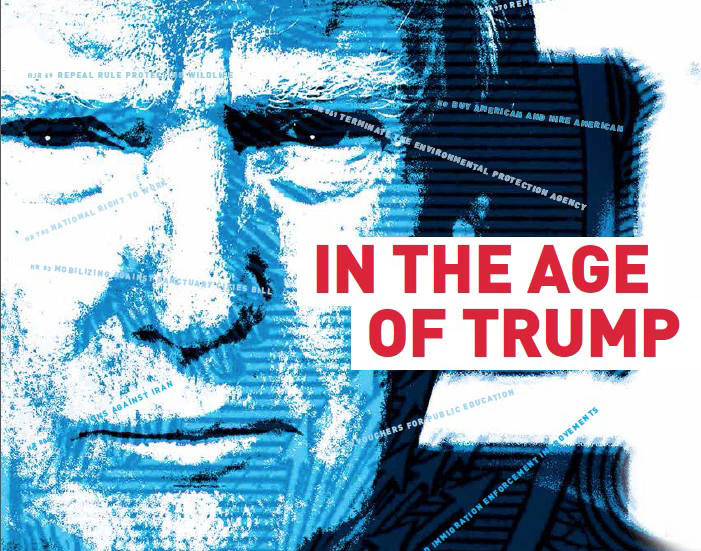
By Bethany Romano, MBA'17
Donald Trump’s ascendance to the White House has signaled a sea change in many of the social policy areas to which faculty, researchers and students at Heller devote their careers. From health care to business ethics, to international development and conflict mediation, the president’s priorities impact our community on academic, professional, educational and personal levels. In this series, a faculty member from each program predicts how his or her field is likely to respond and react to the age of Trump.
Fostering transformative leadership and peaceful plurality
By Mari Fitzduff, professor and founding director of the Master’s in Conflict Resolution and Coexistence program
Coexistence programs are all geared towards managing groups of people with differing values or aspirations, and helping them to manage such differences in a productive, positive way. Unfortunately, from what we can observe thus far, President Trump seems less interested in serving all of his people and their needs. Rather, he seems interested in delivering on campaign promises solely for those who voted for him.
In our field, this kind of leader is called transactional – a leader who takes pride in only delivering for their followers, and forgetting about, or debasing the needs of other groups. What we rarely see enough of are transformative leaders – those who, when elected, can embrace the needs of all of their people, not just one section of them. Understanding how to develop and foster such leadership is critical for our students in the many conflicts in which they work around the world.
In the U.S., political and value differences have widened over the past few years, accelerating with Trump’s divisive campaign, and continuing into what looks likely to be a very contentious presidency. Our students are trained to develop and facilitate the kinds of local and national dialogues that are needed in the U.S. and in many situations where our graduates work, both internationally and locally.
These students learn to do the important work of identifying who feels left out in a society, and why. We look at inequalities and the tensions they create, and how easily differing identity groups can come to fear and hate each other. We train them to both understand and ameliorate these social and value differences.
Increasingly, all societies are becoming more diverse due to immigration, economic relocation, or increasingly, through refugees. How we manage these differences is critical everywhere. In many cases, it is the mismanagement of such plurality that leads to conflict. Learning to manage and mediate the fear associated with these rapid changes is an essential skill of our present reality, and one that too few people possess. As our world continues to grow and change, we need more professionals who can manage the kinds of difficult conversations we’re struggling with here in the U.S.
The Business Backlash
By Michael Appell, MA’79, assistant director of the MBA in Nonprofit Management program
American businesses—in the name of their profits, their reputations, and their desire to operate in healthy communities – could turn the tide on President Trump. We can already see the telltale signs of a shift in the business sector that could ultimately remove him from power.
Too often, business is only cited for its negative influences. Because it is evolving slowly and out of sight of the media, business activity is not getting the attention it deserves. The Business Backlash is a slow-speed revolution that will not be televised. Here are some reasons why business will dump Trump and lead to his eventual demise:
- SURPRISES – Big or little, business (and the stock market) dislikes surprises. Donald Trump is the king of surprises. Don’t expect markets to stick with him if they can’t see clearly down the road.
- REGULATION – Markets rose on the hope that regulations would be eased. Now it is clear that, as in all matters regulatory, the devil is in the details. Trump is not a details guy.
- SUSTAINABILITY –The business case for sustainability has been made countless times. Simply put, sustainable products, services and business strategies often lead to greater corporate profitability.
- TRADE – Most successful American companies view themselves as global corporations. A tariff-based economy or a “wild west” trade scenario would crush everything they have spent decades building.
- TRANSPARENCY - American companies around the world base their decisions on data from government and related sources. They won’t accept information blackouts and poor reporting forever.
- HUMAN CAPITAL – Companies need a truly diverse workforce to be competitive, and shareholders and stockholders alike want them to stand up for principles that lead to greater inclusion.
- SCIENCE IS REAL – Business depends on government to fund and promote robust science and technology endeavors. A government that denies the importance of science or seeks to truncate its work will not be tolerated for long.
- BUSINESS GETS GLOBALIZATION – Companies understand that we live in a world that is not only interconnected, but also tightly interdependent. Markets will fight back against efforts to stifle global networks.

Why you should study public policy in the age of Trump
Michael Doonan, PhD’02, director of the Master’s in Public Policy program
With the election of Donald Trump, it’s critical that our public policy students double down on their own careers because policy analysis has become more—not less—important. While data and analysis seem to have taken a back seat to tweets and tabloid-type rants, good policy demands that we know how policy impacts people and be prepared to offer alternatives that forward social justice.
My own experience is a good example. I worked for the Clinton healthcare plan in the 1990s. I watched it fall apart and I was career depressed, much like many people are right now. At that point, I decided to return to school. I came to Heller to recharge my batteries, and to focus on what the states and localities could do.
By coming to Heller, where I could study both political science and health services, I was able to play some part in Massachusetts’ healthcare reform efforts. It was RomneyCare, which happened before ObamaCare. The Commonwealth got to 97, 98 percent coverage, and that turned out to be a model for national reform.
It’s not just healthcare—many policies are foreshadowed in state governments before they go national. Take fuel efficiency standards for cars. It wouldn’t have happened nationally if it didn’t happen in California first. This works on conservative causes, too. For example, pro-life groups state-by-state are limiting or restricting one small rule at a time, which could ultimately have a major impact nationally on access to these health services.
President Trump’s perspective and policy prescriptions are ambiguous, subject to change and most often not based on research or evidence. The solutions our students develop, however, need to be rooted not just in their opinions and in their values, but in a concrete understanding of social policy and social science. The agencies of the federal government use data and analysis. Governors and mayors use it to shape programs. At Heller, we prepare our students to offer policy alternatives when the time is right, regardless of who is in the White House.
Taking a Global View of Health Systems
By Diana Bowser, director, and Monica Jordan, assistant director of the Master’s in Global Health Policy and Management program
Ongoing health policy changes in the United States have demonstrated that now, more than ever, we need socially conscious students with a deep understanding of these issues to strengthen health systems in the U.S. and around the world.
President Trump campaigned on the promise of undoing the Affordable Care Act (ACA), and by Jan. 12, the Senate approved a budget that would allow its repeal. This was a first step in the process of dramatically decreasing both health care coverage and individual health care rights. Repealing the ACA would also impact life-saving Medicaid expansions and Medicare coverage, potentially increasing premiums and prescription drug costs for seniors. It is imperative we understand the current system and all the possible fallout from these policy changes.
Taking a global view of health systems gives us a broader understanding of system weaknesses and ways to improve them. Countries everywhere are facing the demographic shock of rapidly aging populations and the parallel increase of chronic illnesses such as heart disease, cancer, and diabetes. Consider the Middle East, a region with one of the highest breast cancer mortality rates for women under 60. Some of the richest countries in the world are located in this region, yet they are struggling to adapt their health systems to these changes. Our master’s program in Global Health Policy and Management teaches students how health systems are designed and how to use lessons from other countries to improve your own system.
The field of global health policy teaches us to responsibly consume and interpret scientific research and data to build and defend an argument. We refuse to let policies based in fear, rather than facts, affect our work. Many of the issues currently facing healthcare systems, such as the rise of chronic diseases, span countries and continents. We will continue to collaborate and build ties with agents of change for healthcare systems globally. It is imperative that we work together and bring diverse perspectives to tackle serious threats to human health.

The Role of Research in the Age of Trump
Jeffrey Prottas, director of the PhD in Social Policy program
We all have values and an image in our mind of the way the world should be. These are our roadmap for seeking to improve society, which is of great importance to the Heller School. But it is not enough. Our students must know how the policy world works and how public actions actually affect us.
Research makes possible the connection between aspirations and actual outcomes. President Trump doesn’t do that. He wants a wall to keep Mexicans out. We do not agree with him about keeping Mexicans out, but let’s face it—he doesn’t care what we think. What we could say to him is, “You want to keep Mexicans out? This wall is not going to do it.” Or, “This wall is going to keep out one Mexican for every million dollars spent. Therefore, it’s in your economic interest to find another way to do it.”
Previously, lawmakers didn’t necessarily listen to research, but they did not say the facts don’t matter. President Trump, however, is basically saying that facts have no bearing, and what’s really important is what he thinks. He has created a public, conceptual challenge that suggests there is no reason to do research because it’s what you believe that matters, not what you can show. That’s a symbolic escalation that is very threatening not only to us as a graduate school, but also to education in general.
Even in President Trump’s world, however, facts do matter when concrete decisions have to be made. Let’s take the wall. It would be useful to know whether it needs to be 17 feet high with snakes on the top, or if three feet is fine. That would help President Trump build an effective wall, or the research might lead him to conclude that the wall isn’t the best method to keep people out of the U.S.
Research matters if you want to achieve a goal, whether it’s to decrease drug use, increase immigration or build a wall. Pronouncements will only take you so far. Analysis, based on a true understanding of the world, is what turns plain talk into concrete reality.
Why study global development in the isolationist age of Trump?
Rajesh Sampath, associate director of the Master’s in Sustainable International Development program
With any new administration, there is always a reason to study development. If we look back at former President George W. Bush, he took a surprising turn away from his campaign promises to become more isolationist, particularly after 9/11. Throughout his presidency he showed concern about aid, most significantly in his commitment to Africa and its socio-economic development. By the time President Obama took office, there was a strong sense of a cosmopolitan ideal to ensure that societies are in peaceful cooperation and diplomatically striving towards common aspirations like the United Nations’ Sustainable Development Goals.
The approach of the previous two presidential administrations is in direct contrast to the inward-looking mentality of President Donald Trump, who wants to return the U.S. to a setting in which we put the United States first, above all else.
Development is inextricably bound not just to sustainability issues, but to human rights issues as well. That is hard to defend when the president may not even care about domestic wealth inequality, let alone global inequality.
Studying and promoting development makes a statement that these universal goals still matter, and that the commitment to our species as a whole supersedes our obligations as citizens to take care of a single national economy.
For me, development at its core is global social justice. It has to deal with not only the alleviation of poverty and sustainability of the environment, but facing state-sponsored oppression of certain groups head on. In our domestic context, consider the United States’ prison industrial complex or the profound, structural racial inequality that is exacerbated by the sort of white nativist ideology emanating from some of Trump’s spokespeople and strategic advisers.
Development today is an affirmation that we care about common goals as the path forward for the planet. Otherwise, we’re not going to survive as a species. When we commit to development work, it is a direct statement of opposition to those who don’t feel that international problems, like global poverty and social inequality of minorities, are an issue.
--
This story originally appeared in the Summer 2017 issue of Heller Magazine. Read the full magazine online or download it here.
